Comprehensive Analysis: Brexit's Impact on the UK Retail Industry
VerifiedAdded on 2023/01/12
|10
|2218
|98
Report
AI Summary
This report examines the multifaceted impact of Brexit on the UK retail industry. It explores both the negative consequences, such as increased business costs due to changes in import/export regulations and labor shortages, and the potential positive effects, like increased opportunities for UK-based skilled labor. The report delves into the methodology used, including both qualitative and quantitative data collection through primary and secondary methods. Data analysis reveals trends in internet sales, store closures, and consumer behavior. The report recommends strategies for retail companies to navigate the post-Brexit environment and concludes that while challenges exist, the sector must adapt to maintain profitability and meet consumer demands. The research incorporates findings from various sources, including books and journals, to provide a comprehensive overview of the topic.
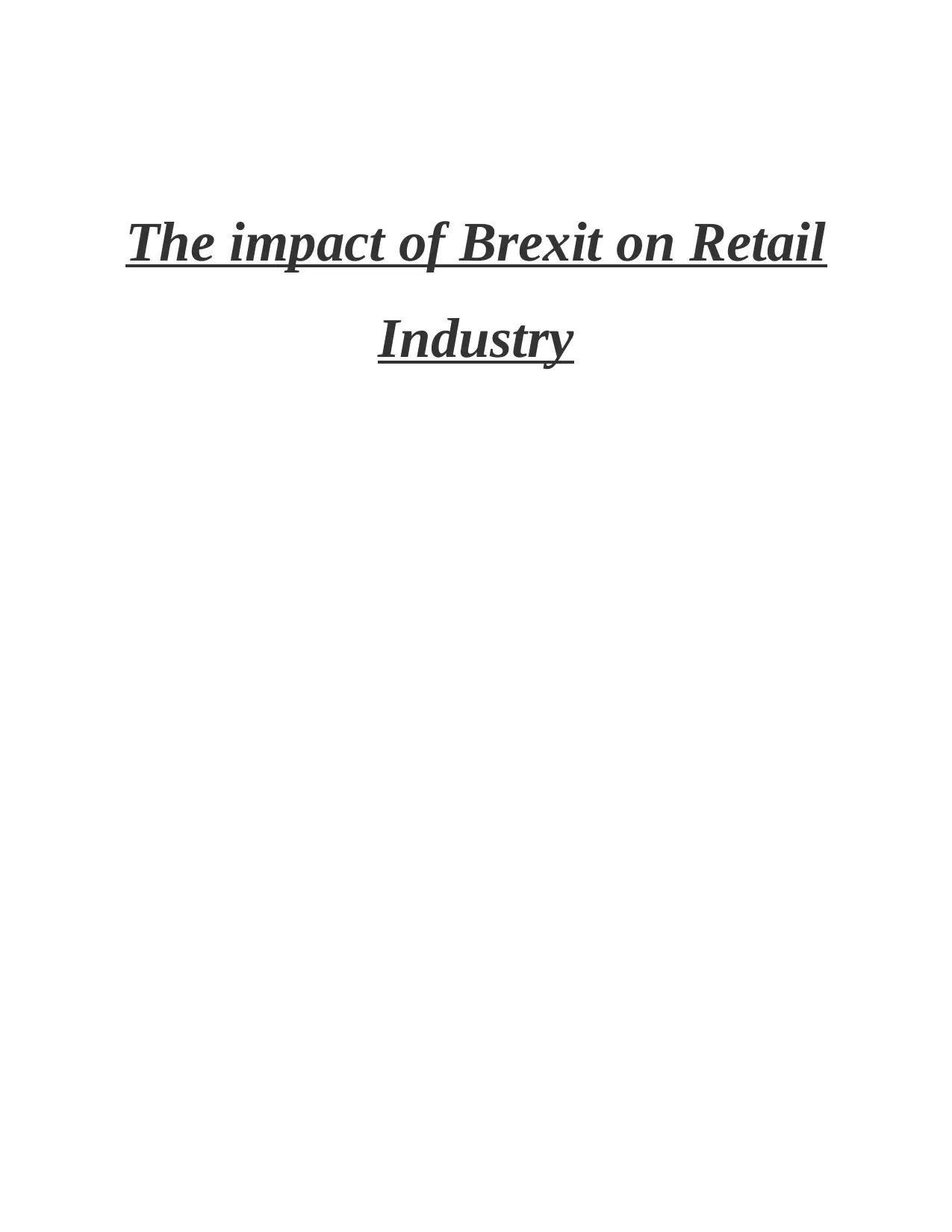
The impact of Brexit on Retail
Industry
Industry
Paraphrase This Document
Need a fresh take? Get an instant paraphrase of this document with our AI Paraphraser
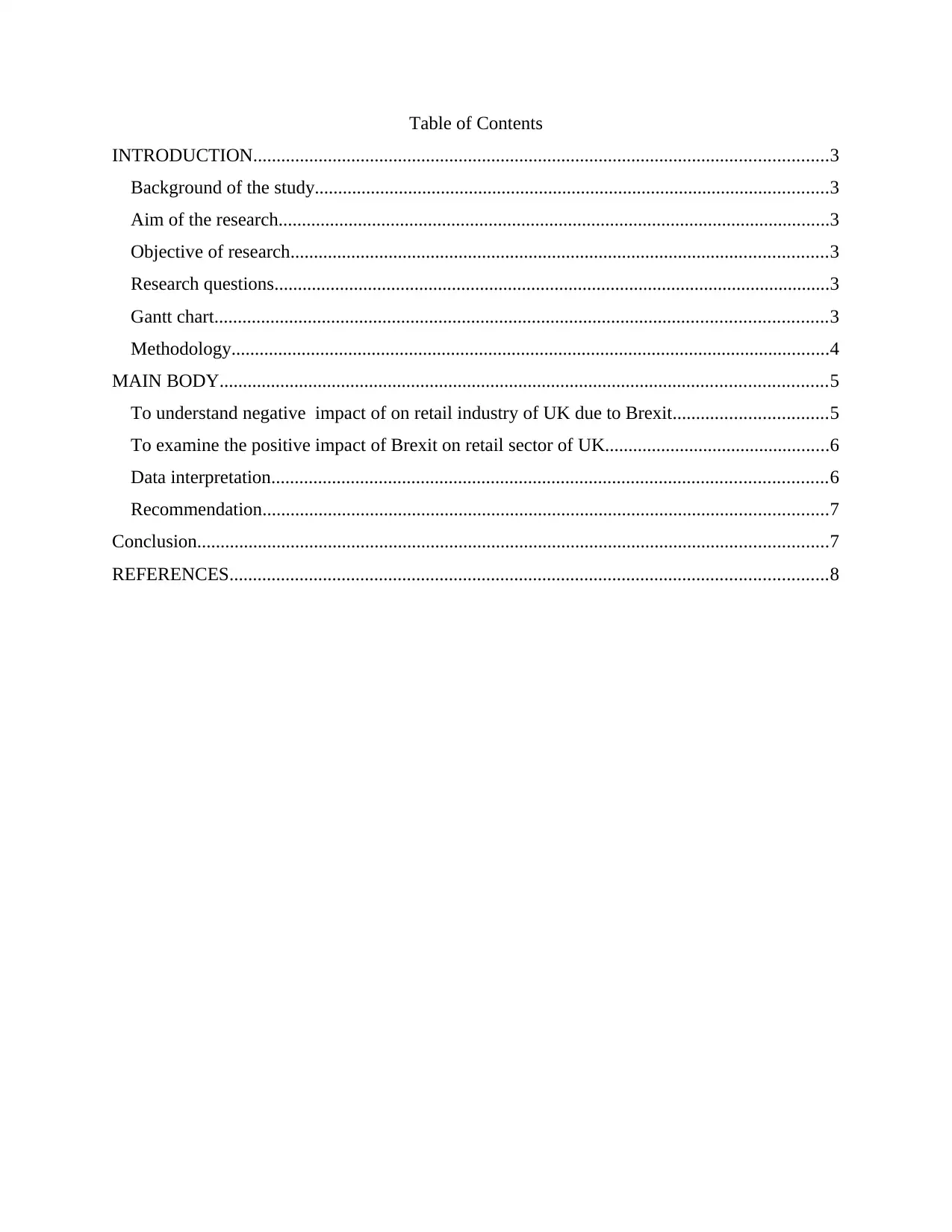
Table of Contents
INTRODUCTION...........................................................................................................................3
Background of the study..............................................................................................................3
Aim of the research......................................................................................................................3
Objective of research...................................................................................................................3
Research questions.......................................................................................................................3
Gantt chart...................................................................................................................................3
Methodology................................................................................................................................4
MAIN BODY..................................................................................................................................5
To understand negative impact of on retail industry of UK due to Brexit.................................5
To examine the positive impact of Brexit on retail sector of UK................................................6
Data interpretation.......................................................................................................................6
Recommendation.........................................................................................................................7
Conclusion.......................................................................................................................................7
REFERENCES................................................................................................................................8
INTRODUCTION...........................................................................................................................3
Background of the study..............................................................................................................3
Aim of the research......................................................................................................................3
Objective of research...................................................................................................................3
Research questions.......................................................................................................................3
Gantt chart...................................................................................................................................3
Methodology................................................................................................................................4
MAIN BODY..................................................................................................................................5
To understand negative impact of on retail industry of UK due to Brexit.................................5
To examine the positive impact of Brexit on retail sector of UK................................................6
Data interpretation.......................................................................................................................6
Recommendation.........................................................................................................................7
Conclusion.......................................................................................................................................7
REFERENCES................................................................................................................................8
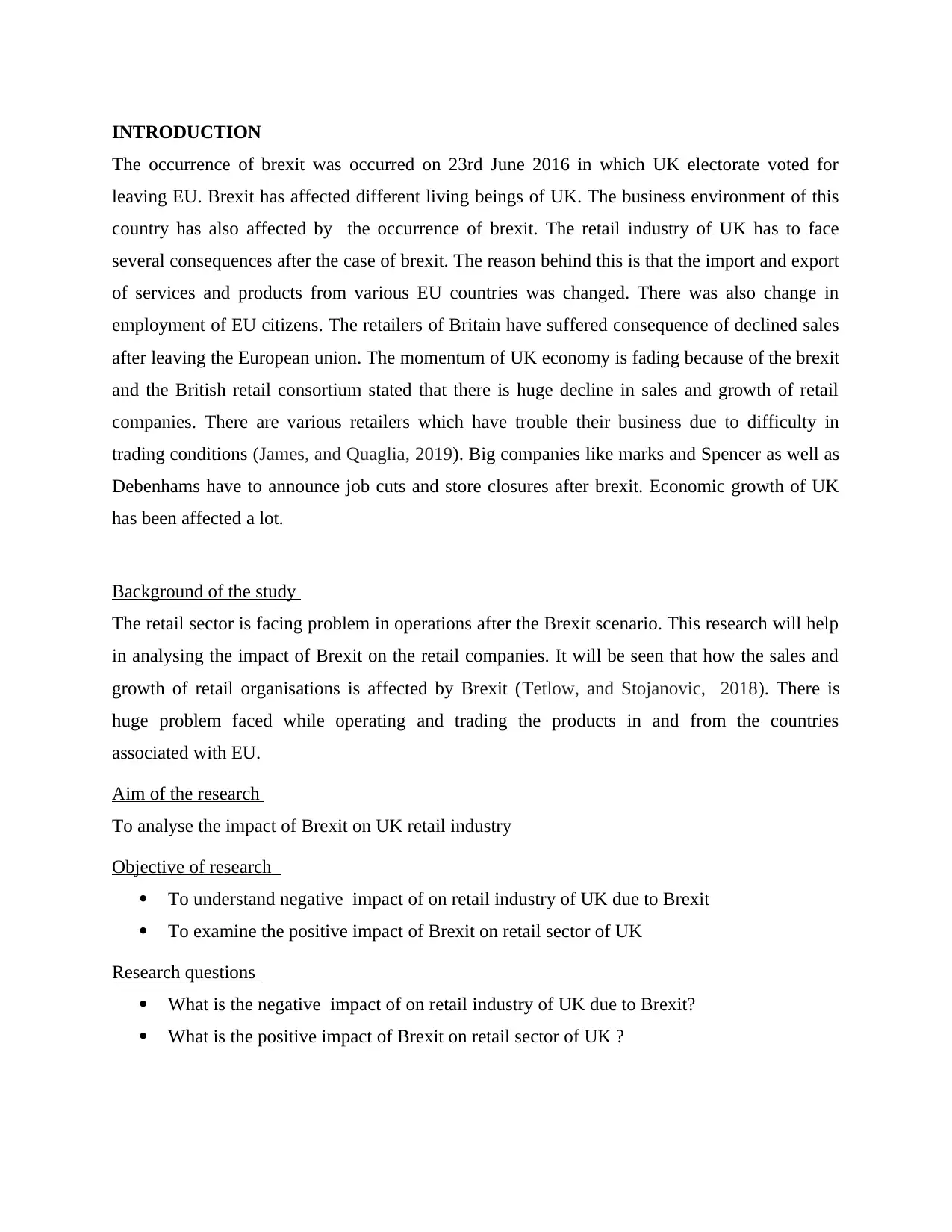
INTRODUCTION
The occurrence of brexit was occurred on 23rd June 2016 in which UK electorate voted for
leaving EU. Brexit has affected different living beings of UK. The business environment of this
country has also affected by the occurrence of brexit. The retail industry of UK has to face
several consequences after the case of brexit. The reason behind this is that the import and export
of services and products from various EU countries was changed. There was also change in
employment of EU citizens. The retailers of Britain have suffered consequence of declined sales
after leaving the European union. The momentum of UK economy is fading because of the brexit
and the British retail consortium stated that there is huge decline in sales and growth of retail
companies. There are various retailers which have trouble their business due to difficulty in
trading conditions (James, and Quaglia, 2019). Big companies like marks and Spencer as well as
Debenhams have to announce job cuts and store closures after brexit. Economic growth of UK
has been affected a lot.
Background of the study
The retail sector is facing problem in operations after the Brexit scenario. This research will help
in analysing the impact of Brexit on the retail companies. It will be seen that how the sales and
growth of retail organisations is affected by Brexit (Tetlow, and Stojanovic, 2018). There is
huge problem faced while operating and trading the products in and from the countries
associated with EU.
Aim of the research
To analyse the impact of Brexit on UK retail industry
Objective of research
To understand negative impact of on retail industry of UK due to Brexit
To examine the positive impact of Brexit on retail sector of UK
Research questions
What is the negative impact of on retail industry of UK due to Brexit?
What is the positive impact of Brexit on retail sector of UK ?
The occurrence of brexit was occurred on 23rd June 2016 in which UK electorate voted for
leaving EU. Brexit has affected different living beings of UK. The business environment of this
country has also affected by the occurrence of brexit. The retail industry of UK has to face
several consequences after the case of brexit. The reason behind this is that the import and export
of services and products from various EU countries was changed. There was also change in
employment of EU citizens. The retailers of Britain have suffered consequence of declined sales
after leaving the European union. The momentum of UK economy is fading because of the brexit
and the British retail consortium stated that there is huge decline in sales and growth of retail
companies. There are various retailers which have trouble their business due to difficulty in
trading conditions (James, and Quaglia, 2019). Big companies like marks and Spencer as well as
Debenhams have to announce job cuts and store closures after brexit. Economic growth of UK
has been affected a lot.
Background of the study
The retail sector is facing problem in operations after the Brexit scenario. This research will help
in analysing the impact of Brexit on the retail companies. It will be seen that how the sales and
growth of retail organisations is affected by Brexit (Tetlow, and Stojanovic, 2018). There is
huge problem faced while operating and trading the products in and from the countries
associated with EU.
Aim of the research
To analyse the impact of Brexit on UK retail industry
Objective of research
To understand negative impact of on retail industry of UK due to Brexit
To examine the positive impact of Brexit on retail sector of UK
Research questions
What is the negative impact of on retail industry of UK due to Brexit?
What is the positive impact of Brexit on retail sector of UK ?
⊘ This is a preview!⊘
Do you want full access?
Subscribe today to unlock all pages.

Trusted by 1+ million students worldwide
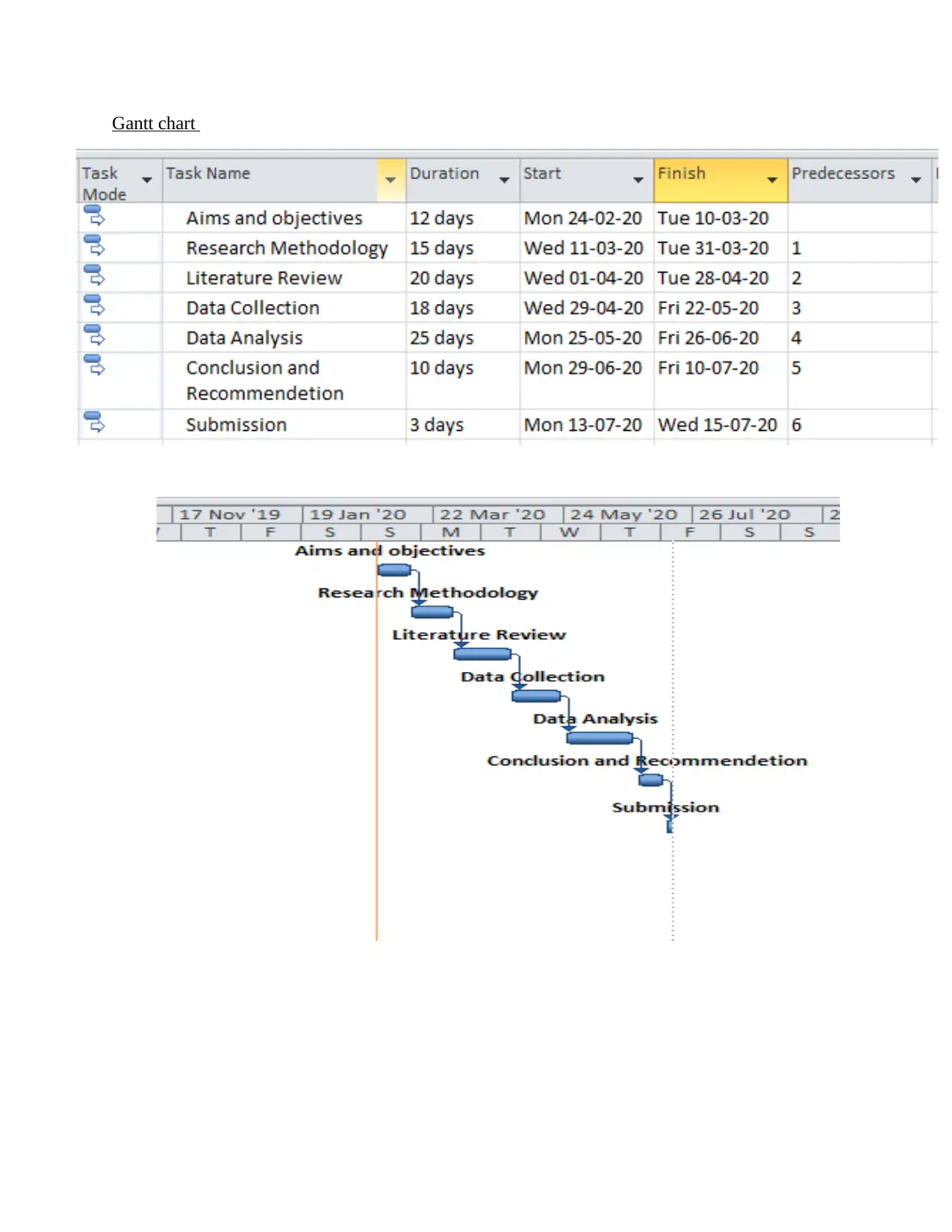
Gantt chart
Paraphrase This Document
Need a fresh take? Get an instant paraphrase of this document with our AI Paraphraser
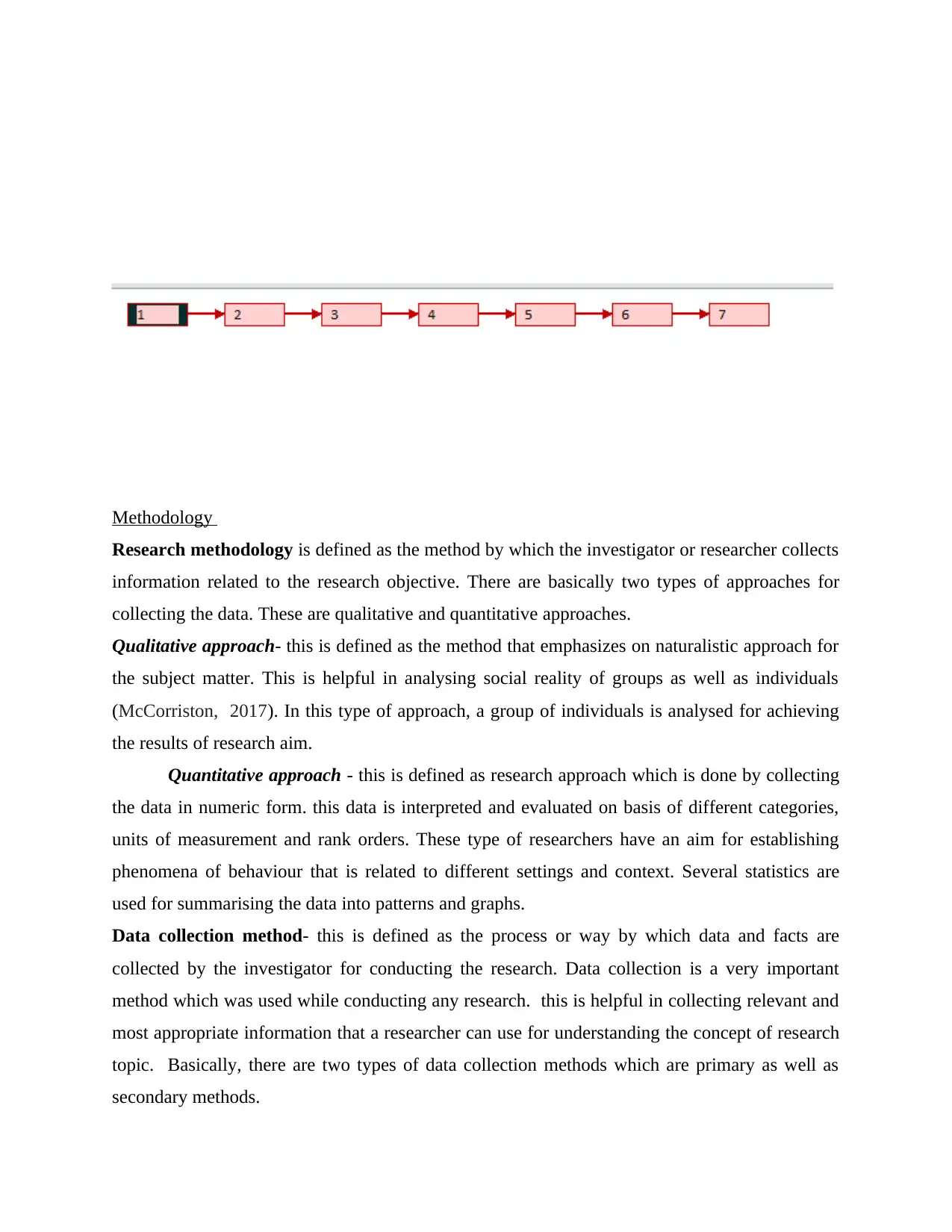
Methodology
Research methodology is defined as the method by which the investigator or researcher collects
information related to the research objective. There are basically two types of approaches for
collecting the data. These are qualitative and quantitative approaches.
Qualitative approach- this is defined as the method that emphasizes on naturalistic approach for
the subject matter. This is helpful in analysing social reality of groups as well as individuals
(McCorriston, 2017). In this type of approach, a group of individuals is analysed for achieving
the results of research aim.
Quantitative approach - this is defined as research approach which is done by collecting
the data in numeric form. this data is interpreted and evaluated on basis of different categories,
units of measurement and rank orders. These type of researchers have an aim for establishing
phenomena of behaviour that is related to different settings and context. Several statistics are
used for summarising the data into patterns and graphs.
Data collection method- this is defined as the process or way by which data and facts are
collected by the investigator for conducting the research. Data collection is a very important
method which was used while conducting any research. this is helpful in collecting relevant and
most appropriate information that a researcher can use for understanding the concept of research
topic. Basically, there are two types of data collection methods which are primary as well as
secondary methods.
Research methodology is defined as the method by which the investigator or researcher collects
information related to the research objective. There are basically two types of approaches for
collecting the data. These are qualitative and quantitative approaches.
Qualitative approach- this is defined as the method that emphasizes on naturalistic approach for
the subject matter. This is helpful in analysing social reality of groups as well as individuals
(McCorriston, 2017). In this type of approach, a group of individuals is analysed for achieving
the results of research aim.
Quantitative approach - this is defined as research approach which is done by collecting
the data in numeric form. this data is interpreted and evaluated on basis of different categories,
units of measurement and rank orders. These type of researchers have an aim for establishing
phenomena of behaviour that is related to different settings and context. Several statistics are
used for summarising the data into patterns and graphs.
Data collection method- this is defined as the process or way by which data and facts are
collected by the investigator for conducting the research. Data collection is a very important
method which was used while conducting any research. this is helpful in collecting relevant and
most appropriate information that a researcher can use for understanding the concept of research
topic. Basically, there are two types of data collection methods which are primary as well as
secondary methods.
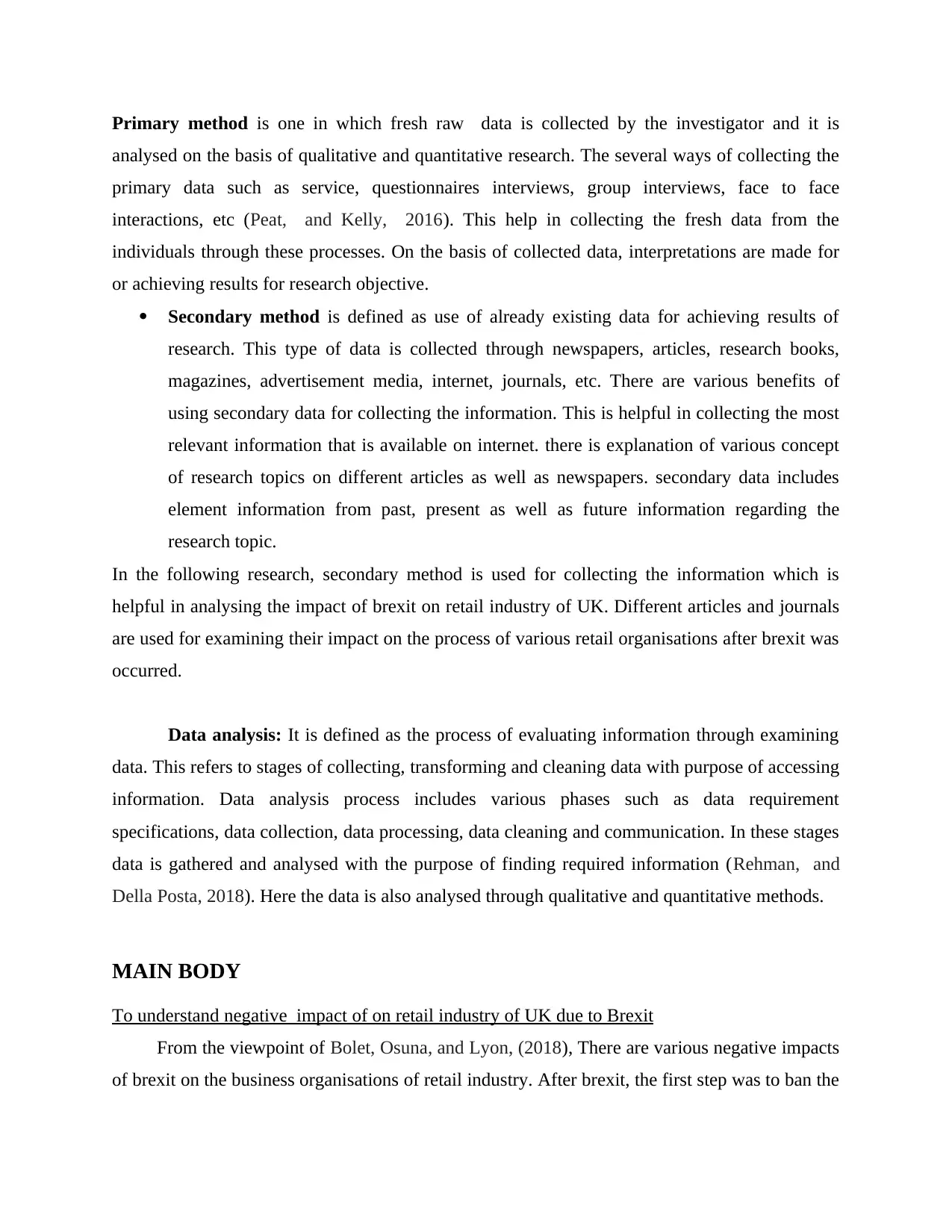
Primary method is one in which fresh raw data is collected by the investigator and it is
analysed on the basis of qualitative and quantitative research. The several ways of collecting the
primary data such as service, questionnaires interviews, group interviews, face to face
interactions, etc (Peat, and Kelly, 2016). This help in collecting the fresh data from the
individuals through these processes. On the basis of collected data, interpretations are made for
or achieving results for research objective.
Secondary method is defined as use of already existing data for achieving results of
research. This type of data is collected through newspapers, articles, research books,
magazines, advertisement media, internet, journals, etc. There are various benefits of
using secondary data for collecting the information. This is helpful in collecting the most
relevant information that is available on internet. there is explanation of various concept
of research topics on different articles as well as newspapers. secondary data includes
element information from past, present as well as future information regarding the
research topic.
In the following research, secondary method is used for collecting the information which is
helpful in analysing the impact of brexit on retail industry of UK. Different articles and journals
are used for examining their impact on the process of various retail organisations after brexit was
occurred.
Data analysis: It is defined as the process of evaluating information through examining
data. This refers to stages of collecting, transforming and cleaning data with purpose of accessing
information. Data analysis process includes various phases such as data requirement
specifications, data collection, data processing, data cleaning and communication. In these stages
data is gathered and analysed with the purpose of finding required information (Rehman, and
Della Posta, 2018). Here the data is also analysed through qualitative and quantitative methods.
MAIN BODY
To understand negative impact of on retail industry of UK due to Brexit
From the viewpoint of Bolet, Osuna, and Lyon, (2018), There are various negative impacts
of brexit on the business organisations of retail industry. After brexit, the first step was to ban the
analysed on the basis of qualitative and quantitative research. The several ways of collecting the
primary data such as service, questionnaires interviews, group interviews, face to face
interactions, etc (Peat, and Kelly, 2016). This help in collecting the fresh data from the
individuals through these processes. On the basis of collected data, interpretations are made for
or achieving results for research objective.
Secondary method is defined as use of already existing data for achieving results of
research. This type of data is collected through newspapers, articles, research books,
magazines, advertisement media, internet, journals, etc. There are various benefits of
using secondary data for collecting the information. This is helpful in collecting the most
relevant information that is available on internet. there is explanation of various concept
of research topics on different articles as well as newspapers. secondary data includes
element information from past, present as well as future information regarding the
research topic.
In the following research, secondary method is used for collecting the information which is
helpful in analysing the impact of brexit on retail industry of UK. Different articles and journals
are used for examining their impact on the process of various retail organisations after brexit was
occurred.
Data analysis: It is defined as the process of evaluating information through examining
data. This refers to stages of collecting, transforming and cleaning data with purpose of accessing
information. Data analysis process includes various phases such as data requirement
specifications, data collection, data processing, data cleaning and communication. In these stages
data is gathered and analysed with the purpose of finding required information (Rehman, and
Della Posta, 2018). Here the data is also analysed through qualitative and quantitative methods.
MAIN BODY
To understand negative impact of on retail industry of UK due to Brexit
From the viewpoint of Bolet, Osuna, and Lyon, (2018), There are various negative impacts
of brexit on the business organisations of retail industry. After brexit, the first step was to ban the
⊘ This is a preview!⊘
Do you want full access?
Subscribe today to unlock all pages.

Trusted by 1+ million students worldwide
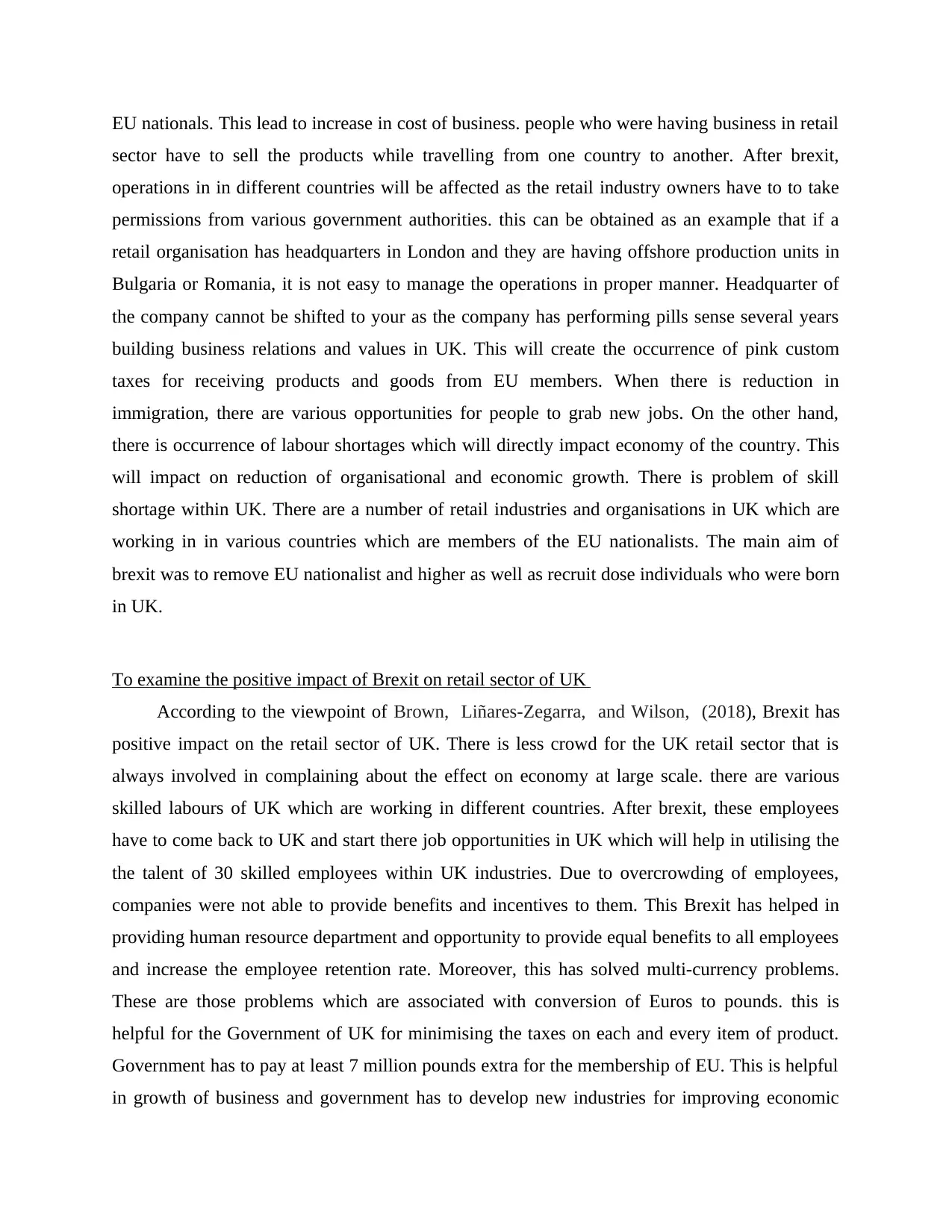
EU nationals. This lead to increase in cost of business. people who were having business in retail
sector have to sell the products while travelling from one country to another. After brexit,
operations in in different countries will be affected as the retail industry owners have to to take
permissions from various government authorities. this can be obtained as an example that if a
retail organisation has headquarters in London and they are having offshore production units in
Bulgaria or Romania, it is not easy to manage the operations in proper manner. Headquarter of
the company cannot be shifted to your as the company has performing pills sense several years
building business relations and values in UK. This will create the occurrence of pink custom
taxes for receiving products and goods from EU members. When there is reduction in
immigration, there are various opportunities for people to grab new jobs. On the other hand,
there is occurrence of labour shortages which will directly impact economy of the country. This
will impact on reduction of organisational and economic growth. There is problem of skill
shortage within UK. There are a number of retail industries and organisations in UK which are
working in in various countries which are members of the EU nationalists. The main aim of
brexit was to remove EU nationalist and higher as well as recruit dose individuals who were born
in UK.
To examine the positive impact of Brexit on retail sector of UK
According to the viewpoint of Brown, Liñares-Zegarra, and Wilson, (2018), Brexit has
positive impact on the retail sector of UK. There is less crowd for the UK retail sector that is
always involved in complaining about the effect on economy at large scale. there are various
skilled labours of UK which are working in different countries. After brexit, these employees
have to come back to UK and start there job opportunities in UK which will help in utilising the
the talent of 30 skilled employees within UK industries. Due to overcrowding of employees,
companies were not able to provide benefits and incentives to them. This Brexit has helped in
providing human resource department and opportunity to provide equal benefits to all employees
and increase the employee retention rate. Moreover, this has solved multi-currency problems.
These are those problems which are associated with conversion of Euros to pounds. this is
helpful for the Government of UK for minimising the taxes on each and every item of product.
Government has to pay at least 7 million pounds extra for the membership of EU. This is helpful
in growth of business and government has to develop new industries for improving economic
sector have to sell the products while travelling from one country to another. After brexit,
operations in in different countries will be affected as the retail industry owners have to to take
permissions from various government authorities. this can be obtained as an example that if a
retail organisation has headquarters in London and they are having offshore production units in
Bulgaria or Romania, it is not easy to manage the operations in proper manner. Headquarter of
the company cannot be shifted to your as the company has performing pills sense several years
building business relations and values in UK. This will create the occurrence of pink custom
taxes for receiving products and goods from EU members. When there is reduction in
immigration, there are various opportunities for people to grab new jobs. On the other hand,
there is occurrence of labour shortages which will directly impact economy of the country. This
will impact on reduction of organisational and economic growth. There is problem of skill
shortage within UK. There are a number of retail industries and organisations in UK which are
working in in various countries which are members of the EU nationalists. The main aim of
brexit was to remove EU nationalist and higher as well as recruit dose individuals who were born
in UK.
To examine the positive impact of Brexit on retail sector of UK
According to the viewpoint of Brown, Liñares-Zegarra, and Wilson, (2018), Brexit has
positive impact on the retail sector of UK. There is less crowd for the UK retail sector that is
always involved in complaining about the effect on economy at large scale. there are various
skilled labours of UK which are working in different countries. After brexit, these employees
have to come back to UK and start there job opportunities in UK which will help in utilising the
the talent of 30 skilled employees within UK industries. Due to overcrowding of employees,
companies were not able to provide benefits and incentives to them. This Brexit has helped in
providing human resource department and opportunity to provide equal benefits to all employees
and increase the employee retention rate. Moreover, this has solved multi-currency problems.
These are those problems which are associated with conversion of Euros to pounds. this is
helpful for the Government of UK for minimising the taxes on each and every item of product.
Government has to pay at least 7 million pounds extra for the membership of EU. This is helpful
in growth of business and government has to develop new industries for improving economic
Paraphrase This Document
Need a fresh take? Get an instant paraphrase of this document with our AI Paraphraser
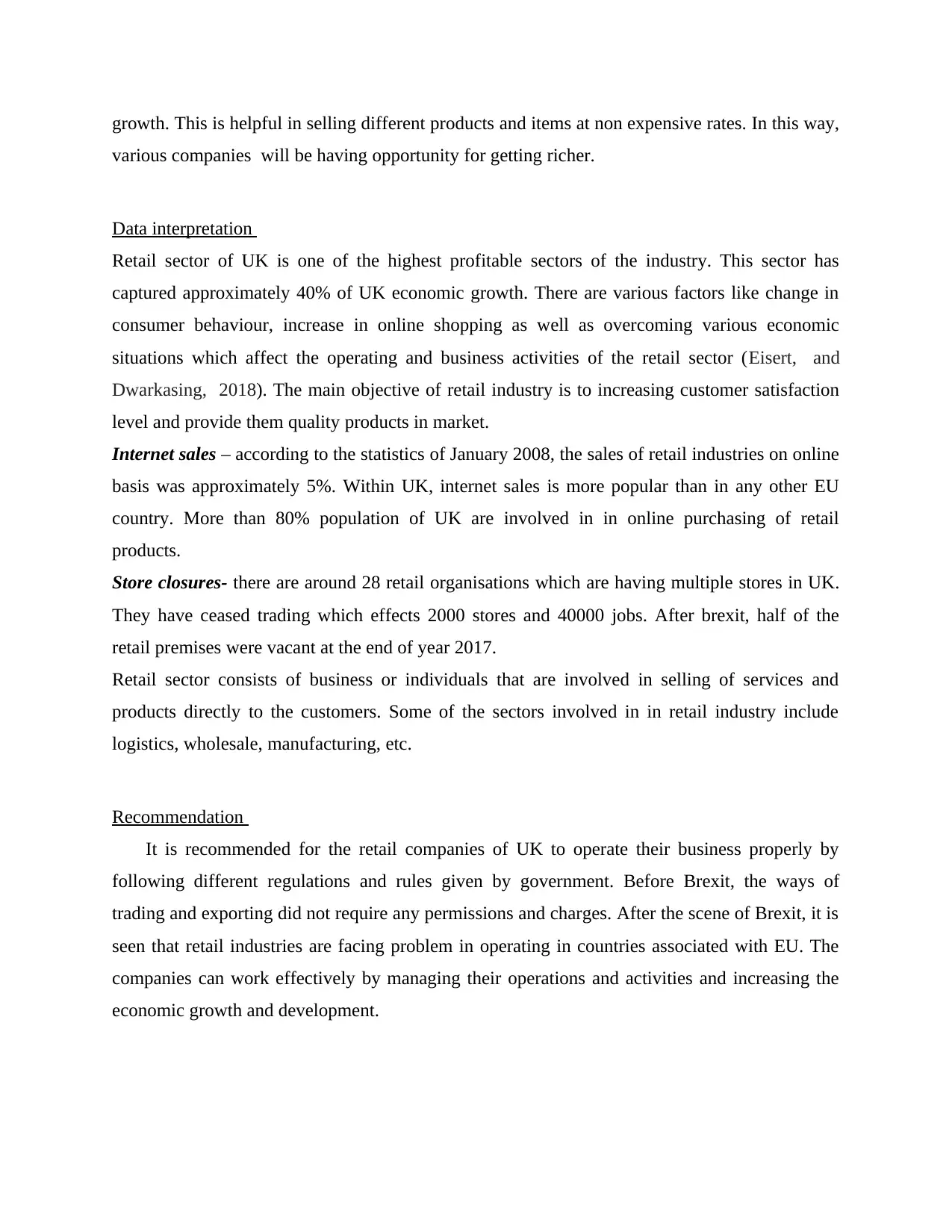
growth. This is helpful in selling different products and items at non expensive rates. In this way,
various companies will be having opportunity for getting richer.
Data interpretation
Retail sector of UK is one of the highest profitable sectors of the industry. This sector has
captured approximately 40% of UK economic growth. There are various factors like change in
consumer behaviour, increase in online shopping as well as overcoming various economic
situations which affect the operating and business activities of the retail sector (Eisert, and
Dwarkasing, 2018). The main objective of retail industry is to increasing customer satisfaction
level and provide them quality products in market.
Internet sales – according to the statistics of January 2008, the sales of retail industries on online
basis was approximately 5%. Within UK, internet sales is more popular than in any other EU
country. More than 80% population of UK are involved in in online purchasing of retail
products.
Store closures- there are around 28 retail organisations which are having multiple stores in UK.
They have ceased trading which effects 2000 stores and 40000 jobs. After brexit, half of the
retail premises were vacant at the end of year 2017.
Retail sector consists of business or individuals that are involved in selling of services and
products directly to the customers. Some of the sectors involved in in retail industry include
logistics, wholesale, manufacturing, etc.
Recommendation
It is recommended for the retail companies of UK to operate their business properly by
following different regulations and rules given by government. Before Brexit, the ways of
trading and exporting did not require any permissions and charges. After the scene of Brexit, it is
seen that retail industries are facing problem in operating in countries associated with EU. The
companies can work effectively by managing their operations and activities and increasing the
economic growth and development.
various companies will be having opportunity for getting richer.
Data interpretation
Retail sector of UK is one of the highest profitable sectors of the industry. This sector has
captured approximately 40% of UK economic growth. There are various factors like change in
consumer behaviour, increase in online shopping as well as overcoming various economic
situations which affect the operating and business activities of the retail sector (Eisert, and
Dwarkasing, 2018). The main objective of retail industry is to increasing customer satisfaction
level and provide them quality products in market.
Internet sales – according to the statistics of January 2008, the sales of retail industries on online
basis was approximately 5%. Within UK, internet sales is more popular than in any other EU
country. More than 80% population of UK are involved in in online purchasing of retail
products.
Store closures- there are around 28 retail organisations which are having multiple stores in UK.
They have ceased trading which effects 2000 stores and 40000 jobs. After brexit, half of the
retail premises were vacant at the end of year 2017.
Retail sector consists of business or individuals that are involved in selling of services and
products directly to the customers. Some of the sectors involved in in retail industry include
logistics, wholesale, manufacturing, etc.
Recommendation
It is recommended for the retail companies of UK to operate their business properly by
following different regulations and rules given by government. Before Brexit, the ways of
trading and exporting did not require any permissions and charges. After the scene of Brexit, it is
seen that retail industries are facing problem in operating in countries associated with EU. The
companies can work effectively by managing their operations and activities and increasing the
economic growth and development.
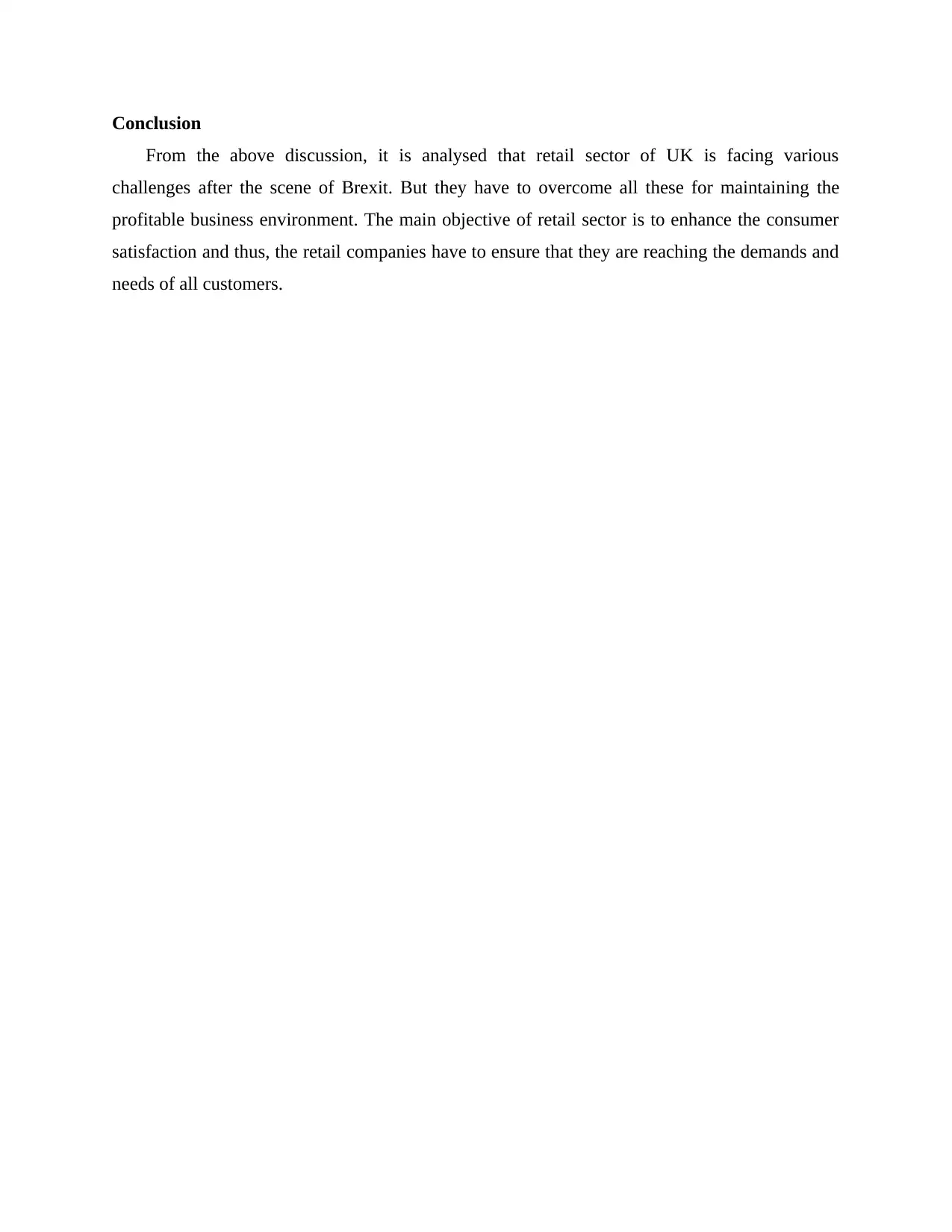
Conclusion
From the above discussion, it is analysed that retail sector of UK is facing various
challenges after the scene of Brexit. But they have to overcome all these for maintaining the
profitable business environment. The main objective of retail sector is to enhance the consumer
satisfaction and thus, the retail companies have to ensure that they are reaching the demands and
needs of all customers.
From the above discussion, it is analysed that retail sector of UK is facing various
challenges after the scene of Brexit. But they have to overcome all these for maintaining the
profitable business environment. The main objective of retail sector is to enhance the consumer
satisfaction and thus, the retail companies have to ensure that they are reaching the demands and
needs of all customers.
⊘ This is a preview!⊘
Do you want full access?
Subscribe today to unlock all pages.

Trusted by 1+ million students worldwide
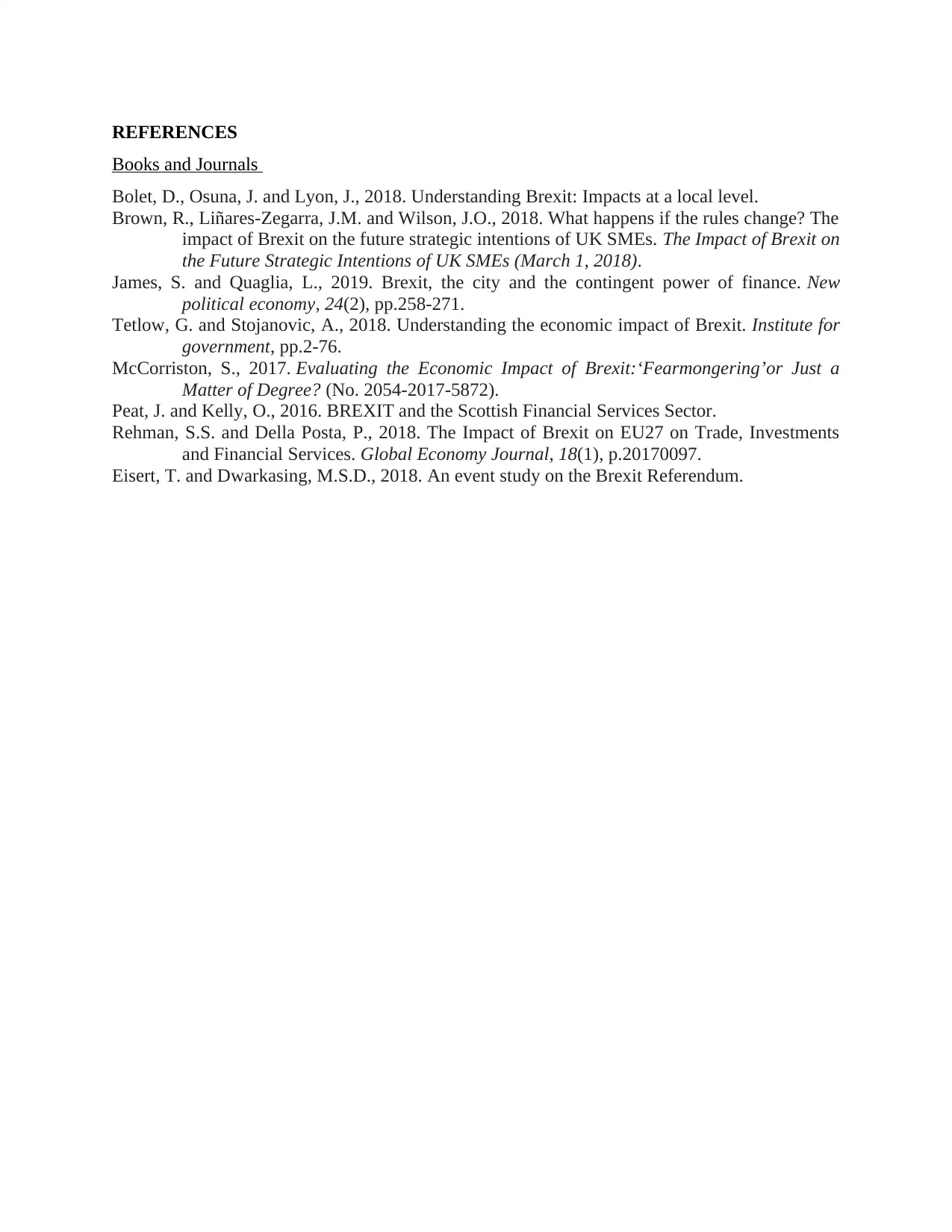
REFERENCES
Books and Journals
Bolet, D., Osuna, J. and Lyon, J., 2018. Understanding Brexit: Impacts at a local level.
Brown, R., Liñares-Zegarra, J.M. and Wilson, J.O., 2018. What happens if the rules change? The
impact of Brexit on the future strategic intentions of UK SMEs. The Impact of Brexit on
the Future Strategic Intentions of UK SMEs (March 1, 2018).
James, S. and Quaglia, L., 2019. Brexit, the city and the contingent power of finance. New
political economy, 24(2), pp.258-271.
Tetlow, G. and Stojanovic, A., 2018. Understanding the economic impact of Brexit. Institute for
government, pp.2-76.
McCorriston, S., 2017. Evaluating the Economic Impact of Brexit:‘Fearmongering’or Just a
Matter of Degree? (No. 2054-2017-5872).
Peat, J. and Kelly, O., 2016. BREXIT and the Scottish Financial Services Sector.
Rehman, S.S. and Della Posta, P., 2018. The Impact of Brexit on EU27 on Trade, Investments
and Financial Services. Global Economy Journal, 18(1), p.20170097.
Eisert, T. and Dwarkasing, M.S.D., 2018. An event study on the Brexit Referendum.
Books and Journals
Bolet, D., Osuna, J. and Lyon, J., 2018. Understanding Brexit: Impacts at a local level.
Brown, R., Liñares-Zegarra, J.M. and Wilson, J.O., 2018. What happens if the rules change? The
impact of Brexit on the future strategic intentions of UK SMEs. The Impact of Brexit on
the Future Strategic Intentions of UK SMEs (March 1, 2018).
James, S. and Quaglia, L., 2019. Brexit, the city and the contingent power of finance. New
political economy, 24(2), pp.258-271.
Tetlow, G. and Stojanovic, A., 2018. Understanding the economic impact of Brexit. Institute for
government, pp.2-76.
McCorriston, S., 2017. Evaluating the Economic Impact of Brexit:‘Fearmongering’or Just a
Matter of Degree? (No. 2054-2017-5872).
Peat, J. and Kelly, O., 2016. BREXIT and the Scottish Financial Services Sector.
Rehman, S.S. and Della Posta, P., 2018. The Impact of Brexit on EU27 on Trade, Investments
and Financial Services. Global Economy Journal, 18(1), p.20170097.
Eisert, T. and Dwarkasing, M.S.D., 2018. An event study on the Brexit Referendum.
1 out of 10
Related Documents
Your All-in-One AI-Powered Toolkit for Academic Success.
+13062052269
info@desklib.com
Available 24*7 on WhatsApp / Email
![[object Object]](/_next/static/media/star-bottom.7253800d.svg)
Unlock your academic potential
Copyright © 2020–2026 A2Z Services. All Rights Reserved. Developed and managed by ZUCOL.





